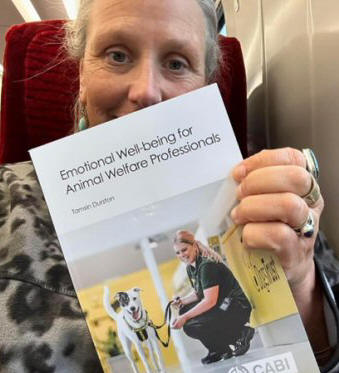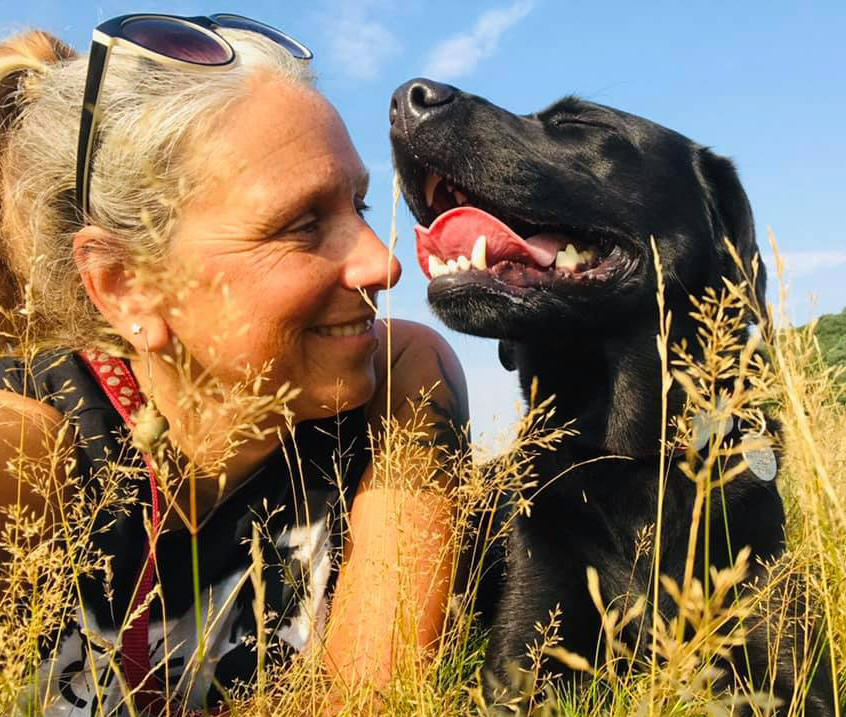By
Tamsin Durston
Reviewed
by Ann Eddington
Publisher: CABI Publishing (Centre for Agriculture
and Bioscience International)
 |
Description: This book examines the
risks to the emotional well-being of animal welfare staff and veterinary
professionals. It provides practical solutions, coping strategies and
various techniques, as well as giving guidance on creating healthy
coping strategies for the emotionally challenging work undertaken by
anyone working directly with animals.
Contents:
-
Introduction
– why is this topic so important?
-
Emotions, stress, and stressor stacking
-
Risk
factors and influences upon emotional health
-
Stress injuries, compassion fatigue, and burnout
-
Self-care
-
Happiness, well-being and positive psychology
-
Imposter syndrome and the Dunning-Kruger effect
-
Developing mind skills
-
Psychology models, the intention-behaviour gap, and forming new
habits
-
Resilience, mindset, and mindfulness
-
Strategies for teams
-
Practical toolkit – everyday activities for maintaining positive
emotional well-being
|
Why did you agree to review this product?
I know Tamsin quite well and was sure
her book was going to be a good read. She is an amazing teacher and an
incredible, kind person. Her help, support and knowledge has been invaluable.
What was your experience with
the book?
I read her book at a time
when I was having some personal challenges after losing my dad. This was one of
my motivations for reading her book. So many of the coping methods and skills
explained in the book helped me over come some difficult times in a very
positive way.
I know the book is written primarily to
help people working in the animal care/training sector but so much of the
content can be related to other real life situations. Positive thinking and
sensitive understanding of others helps you and those around you feel happier.
Be kind to the people around you and towards yourself.
What did you like about this product?:
I understand that those
working in the animal care sector need to look after themselves or they will not
be able to do their best for the animals in their care. So many of the
techniques Tamsin talks about can be used in my field of work, working with
young people and managing a staff team, as well as pet dog owners learning new
dog agility skills or just attending pet dog puppy classes. The book helped me
realise the techniques and skills used are transferable.
I particularly like the
real life case studies that prove how situations can be dealt with positively
for a positive outcome not only for the animals but for their humans.
The book is divided into
three sections.
-
Heart
explores the emotional side of animal welfare
work, the risk factors for us becoming negatively impacted by what we are
exposed to professionally, and the need for us to focus on meeting our own
needs, just as well as those of the animals for whom we care so deeply.
-
Head
examines the psychological aspects of our roles and how
our minds try to make sense of our experience, sometimes to detrimental
effect. However, it also explores ways in which we might gain control over
our conscious experience and develop helpful mind skills to reframe our
perspective more positively and form 'good' habits.
-
Hands is
designed to provide practical tools for
strengthening and maintaining positive well-being in everyday life for
individuals and for teams. These aim to enhance our ability to recover from
setbacks and develop healthy ways of coping with the emotional demands of
our work.
Product specification:
Paperback. 208 pages.
Dimensions: 14.61cm x 1.27cm
x 22.86cm
Price:
Available from the CABI Publishing
website for £36.40 or currently available from and
Amazon for £31.99
Would you
recommend this product to your family and friends?
If you are having personal issues or if you work with people either
in a manger's role or a teaching role, teach any dog training classes of any
kind voluntarily or professionally Tamsin’s book is 'a must read.'
 About
the author... About
the author...
Tamsin Durston has been
a dog training instructor for 25 years. She
has a passion for teaching agility from a behavioural perspective, ensuring dogs
and handlers spend time cementing the foundations of a trusting relationship,
focusing on the emotional as well as the physical safety of dogs and handlers
while learning this fun and fabulous shared activity.
For most of this time,
she's enjoyed being an instructor at North London (formerly Trent Park) Dog
Agility Club, supporting and coaching numerous wonderful handler-dog
partnerships, with a fantastic variety of breeds, across all levels of skill.
A clinical animal
behaviourist with over 20 years' experience as a Registered Veterinary Nurse,
Tamsin has worked as Veterinary Nurse Manager for Blue Cross Animal Hospital for
the majority of this period. While working as Nurse Manager, she placed special
emphasis on creating an inclusive working environment aimed at optimising mental
and emotional health amongst the team of vets, nurses, receptionists and
auxiliary staff which resulted in a highly functioning, emotionally resilient
and communicative team.
As well as undertaking
behaviour counselling appointments, Tamsin currently holds the role of Canine
Behaviour Officer within Dogs Trust's Canine Behaviour and Research Directorate
creating welfare driven, evidenced-based educational resources and materials for
professionals and owners alike.
 About
the reviewer... About
the reviewer...
Ann Eddington started her agility training with
Tamsin over 20 years ago. They took part in their first agility beginners course
at Trent Park Dog Agility Club together. Since then, they have both lost dogs
and gained puppies to start new agility journeys.
She started agility with
Ollie, a Cocker Spaniel that reached Grade 7 before he badly broke his leg and
had to stop competing. Her second dog was Buddy, a Springer Spaniel, that
reached Grade 6, and finally Jesse, a Working Cocker, that is only a youngster
and yet to compete.
Ann and Tamsin continue
to enjoy agility together though Tamsin has recently moved out of London to the
New Forest with her lovely Coco.
Published 30th
September 2024
|